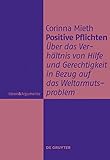Positive Pflichten : Über das Verhältnis von Hilfe und Gerechtigkeit in Bezug auf das Weltarmutsproblem / Corinna Mieth.
Material type: TextSeries: Ideen & ArgumentePublisher: Berlin ; Boston : De Gruyter, [2012]Copyright date: ©2012Description: 1 online resource (259 p.)Content type:
TextSeries: Ideen & ArgumentePublisher: Berlin ; Boston : De Gruyter, [2012]Copyright date: ©2012Description: 1 online resource (259 p.)Content type: - 9783110255645
- 9783110255652
- 171.2 22/ger
- BJ1453
- online - DeGruyter
- Issued also in print.
| Item type | Current library | Call number | URL | Status | Notes | Barcode | |
|---|---|---|---|---|---|---|---|
 eBook
eBook
|
Biblioteca "Angelicum" Pont. Univ. S.Tommaso d'Aquino Nuvola online | online - DeGruyter (Browse shelf(Opens below)) | Online access | Not for loan (Accesso limitato) | Accesso per gli utenti autorizzati / Access for authorized users | (dgr)9783110255652 |
Habil Universität Bonn 2010.
Frontmatter -- Inhalt -- Vorwort -- Einleitung -- Erster Teil: Die Wohltätigkeitsthese: Einige Schwierigkeiten mit positiven Pflichten -- 1 Die Supererogationsthese -- 2 Die Prioritätsthese -- Zweiter Teil: Positive Pflichten in Bezug auf das Weltarmutsproblem -- 3 Einwände gegen die Analogiethese -- 4 Schlussbemerkung -- Literatur -- Begriffsregister
restricted access online access with authorization star
http://purl.org/coar/access_right/c_16ec
Are there strong positive obligations? We obviously consider it a strong obligation to save a drowning child. The first part of this work investigates the factors that define the strength of such an obligation to help and how this is to be differentiated from actions that transcend obligation and from charitable obligations. The second part examines the question whether this case can be transposed to our relationship with those suffering from poverty and cites morally relevant factors that differentiate the cases.
Gibt es starke positive Pflichten? Offensichtlich halten wir es für eine starke Pflicht, ein ertrinkendes Kind zu retten. Was die Stärke einer solchen Hilfspflicht ausmacht und wie sie von Handlungen, die über Pflichten hinausgehen, und Wohltätigkeitspflichten zu unterscheiden ist, ist Gegenstand des ersten Teils der Arbeit. Der zweite Teil stellt die Frage, ob dieser Fall auf unser Verhältnis zu den unter Armut Leidenden übertragen werden kann, und benennt moralisch relevante Faktoren, durch die sich die Fälle unterscheiden.
Issued also in print.
Mode of access: Internet via World Wide Web.
In German.
Description based on online resource; title from PDF title page (publisher's Web site, viewed 28. Feb 2023)


